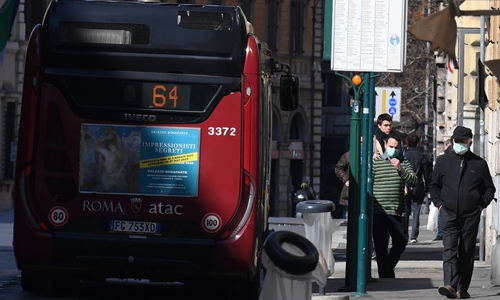HOME >> WORLD
Italy records 12,839 coronavirus cases; president calls for solidarity in EU
Source:Xinhua Published: 2020/3/13 7:40:54

A paramedic works in a tent outside the Brescia Civilians Hospital in Brescia, Italy, March 3, 2020. (Xinhua)
Italian President Sergio Mattarella on Thursday said "solidarity initiatives" from the European Union (EU) on the coronavirus emergency are expected, as the number of infections in the country reached 12,839, and death toll exceeded 1,000.
The latest data provided by the Civil Protection Department showed an increase by 2,249 new infections compared to the previous day, and did not include recoveries or fatalities.
Recoveries grew as well on the daily basis to 1,258 cases from 1,045.
"Of the 12,839 people who tested positive, 5,036 are under home quarantine, 6,650 people are in hospitals, and 1,153 are in intensive care," Civil Protection Department chief and extraordinary commissioner for the coronavirus emergency Angelo Borrelli told a televised press conference.
"The number of patients in intensive care still represents about 10 percent of all positive cases registered since the beginning of the outbreak."
The official added the death toll rose to 1,016.
"Some 98 percent of the people who died since the emergency began were over 68, and 67 percent of them had underline pathologies," Borrelli also explained.
Considering all data (including deaths and recoveries), the total number of assessed coronavirus cases -- since the epidemic appeared on Feb. 21 -- was 15,113 in Italy, which recorded the most cases outside China.
In a brief note on the ongoing emergency, Mattarella said: "Italy is going through a difficult condition, and its experience in fighting the spreading of the coronavirus will likely be useful to all member states of the European Union."
"Solidarity initiatives, instead of steps possibly hampering operations, are therefore expected, and legitimately, at least in the common interest," he added.
On the part of the government, Prime Minister Giuseppe Conte held a phone talks with German Chancellor Angela Merkel on the coronavirus emergency and the need of a stronger coordination among EU partners.
"The two leaders agreed that the pandemic must be placed at the top of the European agenda, both in terms of health and economic effects," PM Conte's office said in a statement.
During the conversation, they reiterated the need for the widest European coordination and partnership in this regard, as well as the belief that all necessary measures must be taken to deal with this global emergency, it added.
Conte would expect "all future working sessions of (European) financial ministers to be focused only on measures to face the heavy economic effects of the coronavirus emergency, starting with the next Eurogroup meeting scheduled on Monday," Ansa news agency also quoted the prime minister as saying in a related report.

People wearing face masks walk on a street in Rome, Italy, on March 12, 2020.(Photo by Elisa Lingria/Xinhua)
The Eurogroup is the EU's informal body where ministers of the euro-area member states discuss matters related to their common currency.
At the daily press conference at the Civil Protection Department, Borrelli explained over 4,600 people -- including some 1,700 volunteers -- were currently deployed across the country to assist people variously affected by the emergency. They added to all medical professionals and public officers also engaged.
The distribution of medical equipment and materials also continued, according to the Civil Protection chief. "We have set up 53 new tents for pre-triage procedures, reaching the total of 515 so far," Borrelli said.
"Over 4 million healthcare devices have been distributed so far, including 1.2 million face masks today."
He added the Civil Protection planned to further allocate "between 1 million and 1.5 million masks every day in the next weeks."
"Some 325 new ventilators (for intensive care) have been distributed in the past few days, and another 116 are being given to Lombardy, Marche, and Veneto regions," Borrelli also said.
Latest distribution data showed Lombardy (6,896), Emilia Romagna (1,758), Veneto (1,297), Piedmont (554), and Marche (570) still had the highest numbers of infections.
They were followed by Tuscany (352), Liguria (243), Campania (174), Lazio region surrounding Rome (172), Friuli Venezia Giulia (148), Sicily (111), autonomous Province of Bolzano (103) autonomous Province of Trento (102), Apulia (98), Abruzzo (78), Umbria (62), Sardinia (39), Calabria (32), Aosta Valley (26), Molise (16), and Basilicata (8).
The country remains under full lockdown. Since Thursday morning, retail shops, coffee bars, pubs, restaurants, hair stylists and beauty salons were also ordered to shut down, adding to the closure of schools, universities, museums, sporting facilities, and a ban on all cultural, sports, religious events and any kind of public gathering.
The only exceptions are supermarkets, pharmacies, public transportation, post offices, banks, farms, and food production industries, which must be kept running in order to guarantee basic services to the public.
Posted in: EUROPE